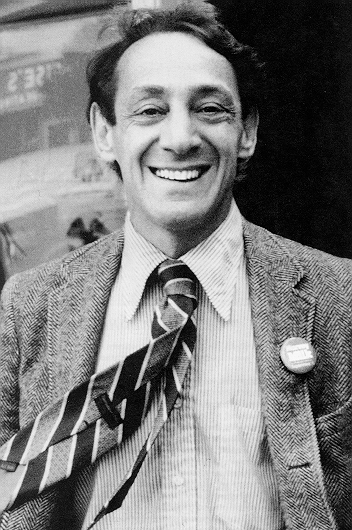
might be seen as the work not of one person but of tens of thousands. The director, however prominent, would count only among the most recent, along with Sean Penn, screenwriter Dustin Lance Black and the rest of the present team. Standing behind that group would be Rob Epstein and his crew [for]...the 1984 documentary The Times of Harvey Milk, while farther back in the crowd you'd find the throngs in San Francisco who gave their moral and material support to the title character (and so to the present movie) by flooding into the voting booths and the streets. If you wanted to compile an accurate production history, I suppose you'd have to look still deeper into the past, before Harvey Milk had thought about political office or even moved to California. Start with the gays of his generation who endured routine harassment, humiliation and arrest, and with the Stonewall Inn rioters who rose in revolt.The film opens with that earlier generation, "a documentary montage of police raids on bygone bars: archival footage full of sudden harsh light, averted faces, tightly packed police wagons and the very occasional defiant glare." The film's opening, Klawan's writes, "is the first of the film's many declarations that Milk is about a movement."
I recommend this film most highly. It is most important, of course, for its portrayal of a moment, and a critical figure, in the gay rights movement. It is also evocative of what seems now to be a lost moment in American politics, or at least Bay Area progressive politics, then fueled by the power of coalitions.
I was working at the Center for Independent Living in Berkeley, a disability rights organization, in November 1978, and I remember gathering in shock around radios to hear the news of the Milk and Moscone murders. Although movements are often remembered for their singular contributions, one enduring legacy of Harvey Milk and the gay rights movement of the time was the effort to build alliances between groups. This helped fuel victories in other movements. While in legal history we often remember the milestones that move change forward, the film also helps us remember is that some of the victories were instead the defeat of measures like the anti-gay Briggs Initiative in California in 1978. Coalition politics can be especially important at times of retrenchment. Coalition work served as the cornerstone of efforts to minimize the impact of California's Proposition 13 (1978), which limited property taxation, on community groups that served poor and minority communities. More on Milk's coalition work is in the Sacramento Bee.
While I remember Harvey Milk's impact on the San Francisco Bay Area, the film makes the case for Milk's broader impact. Wesley Morris wrote of the film in the Boston Globe: "By nearly every measure, 'Milk' is a beautifully made, far less conventional movie biography than most." The director "isn't simply telling the story of a politician. He has undertaken an expanding cultural portrait. The focus grows from a man to a street to a neighborhood to a city to a country."
Michael Dorf weighs in on Milk, arguing that the political trajectory of gay rights in the film
suggests that people who warn against courts moving too fast to recognize same-sex marriage rights (or other rights) are naive. Religious conservatives who oppose liberalization of laws regarding homosexuality, abortion and other social issues will be galvanized into reaction by any change, regardless of whether it comes from the courts or through the democratic process. That fact is not itself a reason for courts to act, but it does suggest that concerns about backlash inspired by courts as such are overblown.Here's the trailer for Milk: